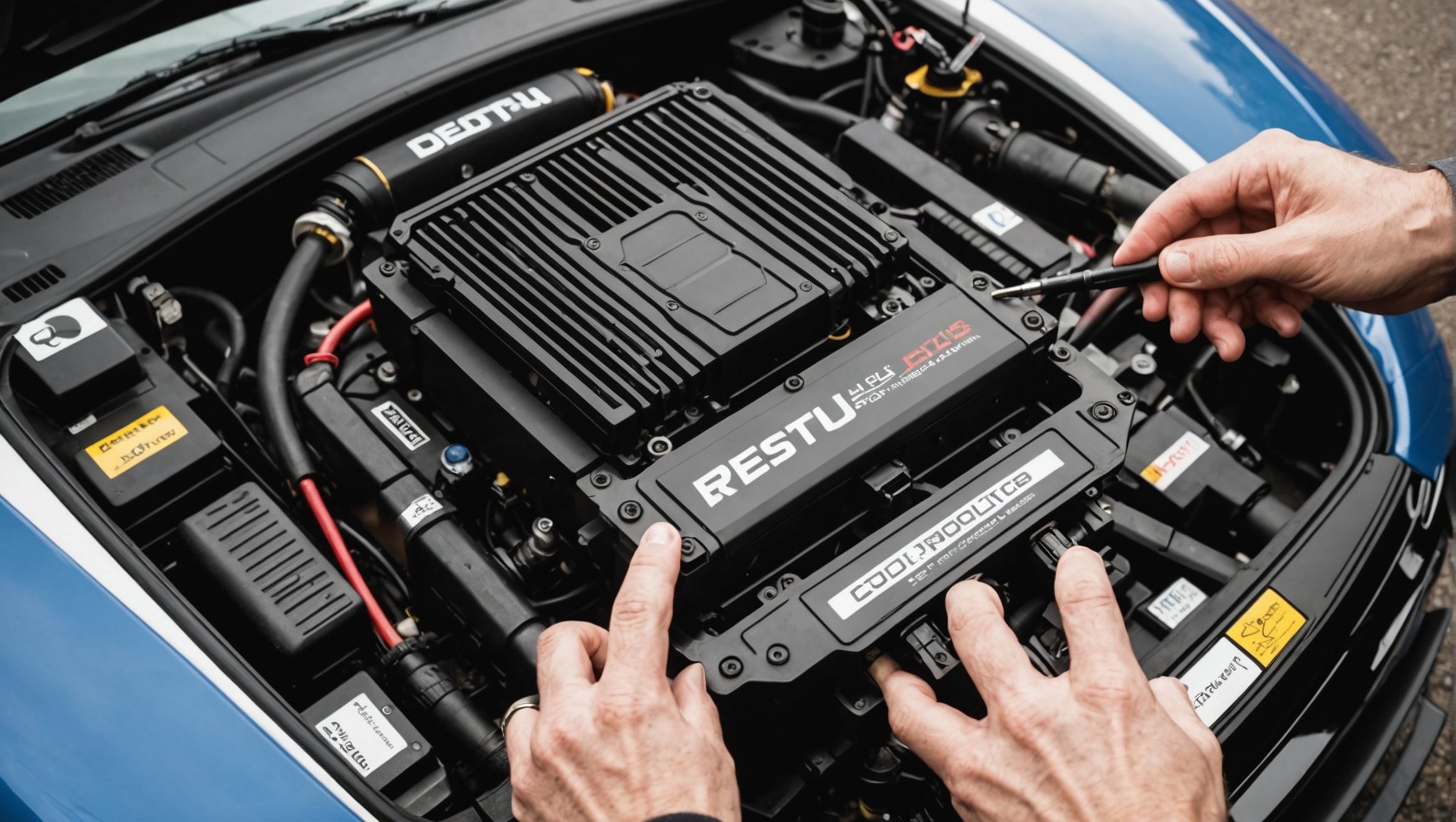Unlock your performance car's true potential by mastering ECU reprogramming. This transformative process enhances efficiency and power, tailoring your vehicle to your driving style. Whether you're a seasoned enthusiast or a newcomer, understanding best practices for ECU adjustments can elevate your experience. Discover effective strategies that ensure not only heightened performance but also reliability and safety for your UK performance car. Get ready to take control of your driving experience and unleash unrivaled capabilities on the road!
Understanding ECU Reprogramming
ECU reprogramming is a process that involves updating the software of a vehicle's Engine Control Unit (ECU) to optimise its performance. This procedure is particularly significant for performance cars in the UK, where enthusiasts seek to maximise their vehicle's capabilities. By altering the ECU's software, owners can achieve notable performance enhancement and improved vehicle efficiency.
Topic to read : Transforming Classic UK Cars: A Guide to Choosing and Installing Modern Bluetooth Audio Systems
The ECU is essentially the vehicle's brain, controlling various engine functions such as fuel injection, ignition timing, and air-fuel ratio. Reprogramming it can lead to increased horsepower and torque, offering a more dynamic driving experience. For performance cars, this means unlocking potential that is often restricted by manufacturers to meet emissions standards or fuel economy targets.
In the UK, where performance cars are popular, ECU reprogramming is a common practice among car enthusiasts. It allows them to tailor the vehicle's performance to their specific driving preferences. This process not only enhances speed and acceleration but also contributes to vehicle efficiency by optimising fuel consumption.
Have you seen this : Boosting Night Vision: Innovative Upgrades for Bi-Xenon Headlights on Your British Luxury Sedan
However, it's crucial to ensure that ECU reprogramming is performed by professionals. Incorrect adjustments can lead to engine damage or void warranties. Therefore, seeking experienced technicians is essential for a successful and safe reprogramming experience.
Benefits of Reprogramming Your ECU
Reprogramming your ECU can unlock a range of performance benefits for your vehicle, making it a popular choice among car enthusiasts. By updating the software, you can achieve significant power gains, resulting in enhanced horsepower and torque. This increase in power not only boosts acceleration but also improves the overall driving experience, providing a more responsive and dynamic feel.
Moreover, reprogramming can lead to improved fuel efficiency. By optimising how the engine uses fuel, the vehicle can achieve better mileage, which is particularly beneficial for those who want to balance performance with economical fuel consumption. This optimisation also helps in reducing emissions, contributing to a more environmentally friendly driving experience.
In addition to power and efficiency, reprogramming the ECU can enhance the vehicle's overall responsiveness and drivability. Adjustments to the engine's parameters can lead to smoother transitions and quicker throttle response, making the car more enjoyable to drive. These improvements are particularly noticeable in performance cars, where precision and agility are paramount.
In summary, ECU reprogramming offers a comprehensive enhancement to a vehicle's performance, addressing key aspects like power, efficiency, and drivability, ensuring a more fulfilling driving experience.
Tools and Software for ECU Reprogramming
Diving into ECU tuning requires the right set of tools and software to ensure a smooth process. For DIY enthusiasts, having the correct ECU tuning tools is crucial. These tools typically include a laptop or PC, an OBD-II interface cable, and a reliable power source to prevent interruptions during reprogramming.
When it comes to software, there are several software recommendations for tuning. Popular platforms like HP Tuners, EcuTek, and Cobb Accessport are well-regarded for their user-friendly interfaces and comprehensive features. These platforms allow users to adjust parameters such as fuel maps, ignition timing, and boost levels, providing a tailored driving experience.
Compatibility is a key concern when selecting tools and software. Ensuring that your chosen diagnostic tools and software are compatible with your vehicle's make and model is essential. This compatibility guarantees that the software can accurately communicate with your ECU, preventing potential errors or malfunctions.
Additionally, some platforms offer community support and tutorials, which can be invaluable for those new to ECU reprogramming. By choosing the right tools and software, enthusiasts can unlock their vehicle's full potential while maintaining reliability and performance.
Step-by-Step Guide to ECU Reprogramming
Embarking on the ECU tuning process requires preparation and attention to detail. Before diving into reprogramming steps, ensure you have the necessary pre-requisites: a compatible vehicle, the right diagnostic tools, and a stable power source to prevent any interruptions.
Pre-requisites Before Starting the Reprogramming
- Vehicle Compatibility: Confirm your vehicle's make and model are compatible with your chosen software.
- Tools and Software: Secure an OBD-II interface cable and install reliable tuning software like HP Tuners or EcuTek.
- Backup: Always back up your ECU's original settings to avoid irreversible changes.
Detailed Steps for Reprogramming the ECU
- Connect your laptop or PC to your vehicle using the OBD-II interface.
- Launch your tuning software and load your vehicle's current ECU map.
- Adjust Parameters: Modify settings such as fuel maps and ignition timing according to your performance goals.
- Save Changes: Ensure all adjustments are saved correctly in the software.
- Upload the new map to your ECU, monitoring for any errors during the process.
Common Pitfalls to Avoid
- Avoid Over-tuning: Excessive adjustments can harm engine performance.
- Monitor Battery Levels: A power loss during reprogramming can corrupt ECU data.
- Verify Settings: Double-check adjustments to prevent engine damage.
By following these steps, enthusiasts can navigate the ECU tuning process with confidence and precision.
Safety Tips When Reprogramming
When engaging in ECU reprogramming, adhering to safety precautions is paramount to avoid potential risks. Proper risk management ensures both the vehicle's and your safety throughout the process.
Disconnecting the Battery
Before starting, it is crucial to disconnect the battery. This step prevents any accidental electrical surges that could damage the ECU or other electrical components. By disconnecting the battery, you create a safe environment for handling sensitive electronics.
Handling Electrical Components Safely
Working with electrical components requires caution. Always use insulated tools and wear gloves to prevent static discharge, which can harm the ECU. Ensure your workspace is dry and free from conductive materials to minimise the risk of short circuits.
Preventing Software Corruption
To avoid software corruption during reprogramming, maintain a stable power supply. A sudden power loss can corrupt the ECU's data, leading to significant issues. Use a reliable power source and monitor battery levels closely to ensure uninterrupted power.
By following these safety precautions, you can effectively manage risks and safeguard both your vehicle and yourself during the reprogramming process.
Legal Considerations for ECU Reprogramming in the UK
When considering ECU reprogramming in the UK, being aware of legal compliance and UK regulations is crucial. Vehicle modifications, including ECU adjustments, must adhere to specific laws to ensure roadworthiness and environmental standards.
Overview of UK Laws Regarding Vehicle Modifications
In the UK, any modification to a vehicle, including ECU reprogramming, must comply with the Road Vehicles (Construction and Use) Regulations. These laws ensure that vehicles remain safe and environmentally friendly. It's essential to understand that failing to comply with these regulations can lead to legal penalties.
Understanding Emissions Regulations
ECU reprogramming can impact a vehicle's emissions, making it vital to adhere to emissions standards set by the UK government. Vehicles must pass the MOT test, which includes emissions checks. Modifications that increase emissions beyond legal limits can result in the vehicle failing this test.
Implications of Non-Compliance for Drivers
Non-compliance with UK regulations can have serious consequences. Drivers may face fines, invalidated insurance, or even vehicle impoundment. Therefore, ensuring that reprogramming aligns with legal requirements is essential for maintaining the vehicle's legality and the owner's peace of mind. Always consult with professionals who understand these legalities to avoid potential issues.
Case Studies: Successful ECU Reprogramming
Exploring real-world examples of successful ECU reprogramming provides valuable insights into the tangible benefits of this process. These case studies highlight the significant performance improvements and user experiences of vehicle owners who have undertaken ECU reprogramming.
Profiles of Vehicles
Many performance cars have undergone reprogramming with remarkable results. For instance, a 2018 Ford Mustang GT experienced a substantial boost in horsepower and torque after ECU adjustments, enhancing its acceleration and overall driving dynamics. Similarly, a BMW M3 saw improvements in throttle response and fuel efficiency, demonstrating the versatility of ECU reprogramming across different vehicle models.
Measurable Performance Enhancements
Owners of reprogrammed vehicles often report measurable gains. In the case of the Mustang GT, dyno tests revealed an increase of 40 horsepower, translating to quicker lap times on the track. The BMW M3 owner noted a 10% improvement in fuel economy, highlighting the dual benefits of power and efficiency achievable through ECU reprogramming.
Testimonials from Vehicle Owners
Vehicle owners frequently share positive user experiences following ECU reprogramming. One Mustang owner remarked on the enhanced driving pleasure, noting the car felt more responsive and engaging. Similarly, the BMW M3 owner praised the improved fuel economy, emphasising the practicality of ECU reprogramming for daily driving.
Professional vs. DIY ECU Reprogramming
Navigating the choice between professional services and DIY tuning is crucial for ECU reprogramming enthusiasts. Each option presents distinct advantages and drawbacks.
Pros and Cons of Hiring a Professional
Opting for a professional ensures expertise and precision. Professionals possess in-depth knowledge, reducing the risk of errors that could damage the engine. They often provide warranties, offering peace of mind. However, professional services can be costly, sometimes exceeding the budget of a typical car enthusiast.
Cost Comparison Between DIY and Professional Services
DIY tuning is generally more affordable, as it eliminates labour costs. Enthusiasts only need to invest in the necessary tools and software. In contrast, professional services often include additional fees for expertise and guarantees. While DIY may save money initially, potential mistakes can lead to expensive repairs.
When to Seek Professional Help
Consider professional assistance if you're unfamiliar with ECU reprogramming or lack confidence in handling complex tuning tasks. Professionals are also recommended when dealing with high-performance vehicles, where precision is essential. In scenarios where liability and warranties are a concern, opting for professional services is prudent.
Troubleshooting Common ECU Reprogramming Issues
After ECU reprogramming, encountering common problems is not unusual and can be addressed with the right approach. Understanding how to troubleshoot these issues is essential for maintaining optimal vehicle performance.
Identifying Typical Issues Post-Reprogramming
Post-reprogramming, vehicles may exhibit symptoms such as error codes, poor engine performance, or unexpected behaviour. These issues often arise from incorrect parameter settings or software incompatibility. Recognising these signs early can prevent further complications.
How to Resolve Error Codes or Performance Issues
To address error codes, start by using a diagnostic tool to read the specific codes generated by the ECU. These codes provide insights into the underlying problems. Adjusting the parameters in your tuning software can often resolve minor issues. If performance issues persist, verify the compatibility of the software with your vehicle.
When to Revert to Stock Settings
In cases where troubleshooting does not resolve the issues, reverting to the ECU's stock settings may be necessary. This step restores the original manufacturer settings, eliminating any changes that might have caused the problem. Always ensure a backup of the original settings before reprogramming to facilitate this process.
Resources and Further Reading
For those eager to expand their knowledge on ECU tuning, a variety of educational resources are available. Recommended books such as "Engine Management: Advanced Tuning" by Greg Banish provide in-depth insights into the complexities of engine control systems. Online courses, like those offered by HPA Academy, deliver comprehensive modules that cover both theory and practical applications of ECU reprogramming.
Engaging with tuning forums is an excellent way to connect with fellow enthusiasts and professionals. Platforms like ECU Tuning World and the UK-based Car Tuning Club offer vibrant communities where users can share experiences, ask questions, and exchange tips. These forums are invaluable for both beginners and seasoned tuners, fostering a collaborative learning environment.
For those preferring expert assistance, numerous professional services in the UK specialise in ECU reprogramming. Companies such as Viezu Technologies and Celtic Tuning provide tailored services, ensuring precision and reliability. These professionals offer a range of solutions, from performance tuning to fuel efficiency enhancements, catering to diverse needs and preferences.
By leveraging these resources, enthusiasts can deepen their understanding and enhance their skills in ECU tuning, ensuring they make informed decisions and achieve optimal results.






